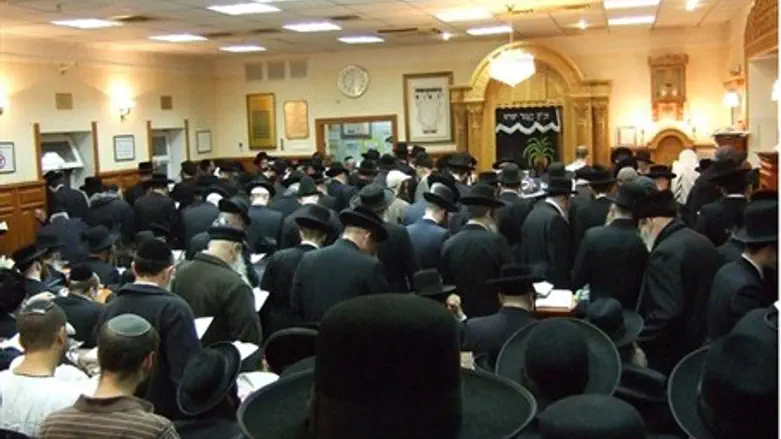
Scores of people were turned away on Saturday night as they attempted to enter – not a theatre, movie premier, concert or four star restaurant – but the packed-to-the-rafters Great Synagogue of Jerusalem. And this in order to pray for forgiveness for past sins.
The Saturday night before Rosh Hashanah, the holiday that ushers in the Jewish New Year, is the first night on which the Ashkenazi community recites the pre-High Holiday slichot [penitential] prayers, and world-famous Cantor Chaim Adler was to lead them at the capital’s Great Synagogue accompanied by a choir led by conductor Eli Jaffe.
Prior to the prayers, Chief Sephardic Rabbi Shlomo Amar spoke at the synagogue, talking of repentance, the need for Jewish unity, and the courage to face unflinchingly the developments in the UN and the Palestinian Authority.
Disappointed, some would-be penitents remained outside in the courtyard where they could hear the Cantor’s powerful voice, others went on to one of the many Ashkenazi synagogues nearby, such as the rotunda-shaped Yeshurun Synagogue which featured Cantor Asher Heinowitz and a choir of young congregants.
Each year in Israel, the number of participants in the first “Zchor Brit" [remember the covenant, ed.] Saturday night Ashkenazi slichot service grows larger and the streets are alive with people at midnight rushing to the various synagogues. The Tel Aviv Great Synagogue is another place that draws large crowds.
Women often attend this first night, but most do not go on the remaining days on which slichot are said before dawn. There must be four days of slichot before the holiday, so that if it begins on Monday or Tuesday, slichot are started a week earlier.
The Sephardic community recites slichot prayers before dawn throughout the entire month of Elul, starting on the second day of the month. Their haunting tune to the supplication “We have sinned before You, have mercy upon us” is known to almost every Israeli, whether of Ashkenazi or Sephardi extraction, young or old, and can be heard throughout the season on the radio or emanating from stores in the markets.
For those who can manage to rise, slichot tours starting at 4 a.m. take an increasingly large part of the population to tour and pray at Sephardi synagogues in various cities in Israel. Most popular of the sites, the ancient city of Tsfat is filled with groups going from one historic synagogue to another before dawn, to hear and participate in the services, ending with music, coffee and refreshments after morning prayers.
Most old Jerusalem Sephardi synagogues are also the site of popular slichot tours, in the Nachalaot, Machane Yehuda and Bucharian quarters especially.
In the Old City of Yafo, the tradition has begun at the initiative of the local.GarinTorani [nucleus of young, Orthodox families who move in groups to development towns to effect change].
Slichot at the Cave of the Patriarchs in Hevron are an unforgettable experience.
The focus of the slichot prayers are a recitation of the 13 Attributes of G-d as they appear in the Torah, repeated at several points in the service with the congregation rising to its feet each time and bending forward as the words “And G-d passed near him [Moses, ed.]” are sung. G-d is described as “kind and merciful, patient and filled with loving kindness and truth, He remembers merits, while cleansing away sins and transgressions...”, hopefully, this will occur at the start of the New Year.
“Hear our voices, have mercy upon us, and accept our prayers…Do not abandon us in our old age, and as our strength wanes, do not leave us…” sings the cantor supplicatingly towards the close of the service, with nary a dry eye in the house.